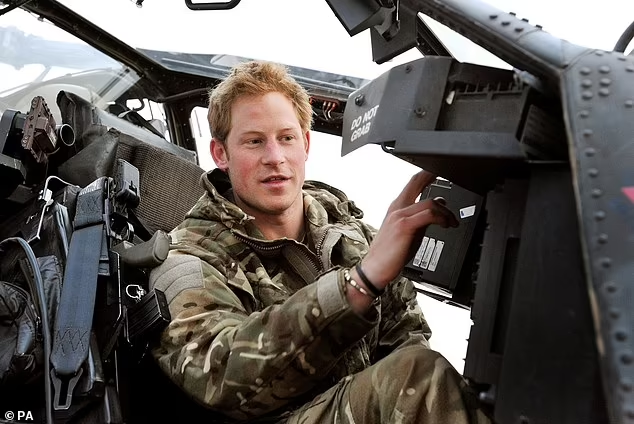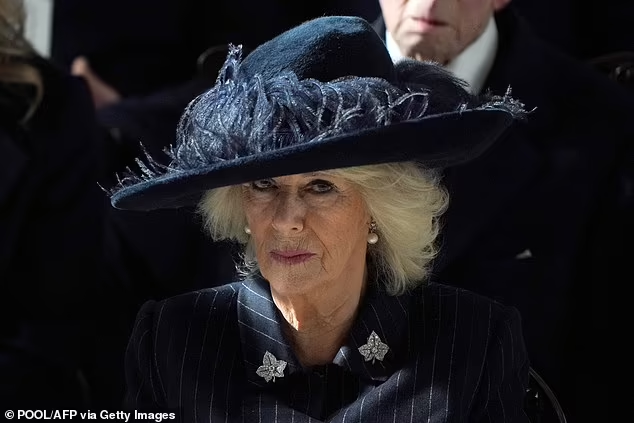Prince Harry said he believed that he was at a greater security risk than his mother, Princess Diana due to 'racism and extremism', High Court documents reveal
Prince Harry expressed his belief that he and his family faced significant risks, especially if their security was downgraded. He emphasized the importance of accountability for ensuring their safety. He claimed he believed he was at a greater risk of being harmed than his mother due to 'racism and extremism', High Court documents have revealed.
 |
Prince Harry making pre-flight checks in the cockpit at Camp Bastion in Afghanistan in 2012
Harry pointed out what he described as "additional layers of racism and extremism" contributing to the perceived threats against his family. This suggests that he sees racial prejudice and extremist ideologies as factors increasing their vulnerability.
 |
Prince Harry and Meghan, pictured at an Invictus Games event in Canada on February 14, 2024
Harry demanded that someone take accountability for the potential consequences of reducing their security, highlighting the seriousness of the situation.
While Harry revealed what he believed to be the biggest threat to his family, specific details were redacted from the court documents, indicating sensitivity or security concerns surrounding this information.
 |
The Duke of Sussex, pictured leaving the Royal Courts of Justice in London on March 30, 2023
The documents also mentioned that Al Qaeda had called for Prince Harry to be killed, likely in response to his actions or statements, such as writing about killing Taliban fighters.
The excerpts from the documents reveal Prince Harry's strong reaction to the decision to downgrade his taxpayer-funded personal security when visiting Britain. His representative, Fiona Mcilwham, conveyed Harry's disbelief at the lack of consultation and his concerns about the increased risk to his family, especially considering the historical context of his mother's tragic death.
Harry's letter expressed frustration and demanded accountability for the decision, particularly highlighting the perceived lack of consideration for the heightened risks, including racism and extremism. He emphasized the importance of maintaining Metropolitan Police (MET) security for their safety, citing specific threats that were redacted from the court documents.
Furthermore, Harry felt that the decision to remove his security was unjust, viewing it as punishment for prioritizing his family's safety. His legal team argued that he was unfairly treated and singled out by the Executive Committee for the Protection of Royalty and Public Figures (Ravec).
The revelation that Al Qaeda had issued a threat against Prince Harry's life underscores the seriousness of the security concerns surrounding him. This threat was reportedly prompted by his actions and writings, particularly his account of combat experiences in Afghanistan detailed in his book "Spare."
Despite this significant security risk, the Government argued that the decision regarding Harry's protection should be customized and evaluated on a case-by-case basis by Ravec. However, the High Court ultimately refused Harry's application for judicial review, prompting his spokesperson to announce plans for an appeal.
The spokesperson emphasized that Harry seeks fair and lawful treatment according to Ravec's own rules, rather than asking for preferential treatment. To proceed with the appeal, Harry will need approval from a judge to bring the case before the Court of Appeal.
The following events occurred amidst the backdrop of Ravec's decision, which was reportedly influenced by Prince Harry's transition away from being a full-time working member of the royal family;
- The sudden passing of Lady Gabriella Windsor's husband, Thomas Kingston, marked a moment of tragedy for the royal family.
- Prince William's unexpected withdrawal from his godfather's memorial service in Windsor added to the intrigue surrounding the royal family.
- Kensington Palace provided updates on Kate's recovery from surgery, reassuring the public about her well-being.
- Prince Harry's involvement in the WellChild Awards, where he paid tribute to seriously ill children, showcased his ongoing commitment to charitable endeavors.
- Buckingham Palace announced Princess Anne's upcoming visit to Dubai, highlighting the royal family's continued engagements on the global stage.
- The King's appearance, following his absence from the memorial service, indicated that his treatment continues as he maintains his duties and public appearances.
 |
Harry's father King Charles III is pictured leaving his London residence Clarence House on Wednesday
 |
Prince Andrew leads members of the Royal Family to St George's Chapel at Windsor Castle to attend a thanksgiving service for the life of the late King Constantine of Greece
 |
Queen Camilla is seen at St George's Chapel on Wednesday as she attends the thanksgiving service
The ruling highlighted Prince Harry's visit to Britain in March of the previous year, during which he attended a High Court hearing related to allegations against Associated Newspapers Limited (ANL). His European security director followed the agreed procedure by formally notifying a Ravec member of Harry's travel plans to the UK.
Given Harry's royal status and the specific security concerns, including threats from Al Qaeda, the Director of European Security emphasized the importance of appropriate protective arrangements for the visit.
In response to the ruling rejecting his judicial review claim against Ravec, Harry's legal spokesperson announced plans to appeal. The spokesperson reiterated Harry's stance on seeking fair and lawful treatment according to Ravec's own rules, without asking for preferential treatment. The appeal aims to ensure that Harry receives the same consideration as others based on Ravec's written policy, especially concerning the risk analysis that was allegedly not applied to him in February 2020.
The judgment summary released in Prince Harry's case affirmed that the court found no unlawfulness, irrationality, or procedural unfairness in the decision made by Ravec regarding his security arrangements. The court deemed the "bespoke" process implemented for Harry as legally sound, dismissing the argument made by his lawyers regarding its interpretation.
Sir Peter emphasized the forward-looking nature of the decision made in February 2020 and highlighted the weight given to the evidence presented by the defendant. He also underscored the relevance of the delegation of the decision-making authority regarding the level of protection to the chair of Ravec, as outlined in the options paper provided by Sir Edward Young, the then-Private Secretary to Queen Elizabeth II.
In light of these findings, Prince Harry's hope for justice from the Court of Appeal suggests his intention to challenge the ruling and seek further legal recourse. However, the statement also indicates his willingness to refrain from making further comments on the matter while the case is ongoing.
The judge's remarks underscored the thoroughness of the procedures followed in assessing Prince Harry's security arrangements. He rejected the contention that the defendant, in this case, Ravec, acted unfairly, particularly noting the role of Prince Harry's private secretary, Fiona Mcilwham, in relaying security details to him.
The judge highlighted Mcilwham's familiarity with the security issues surrounding Prince Harry, as evidenced by her communications and meetings with relevant officials. He dismissed any suggestion that her relatively short tenure as private secretary impacted her understanding of the matter, emphasizing her competence in the role.
Furthermore, the judge accepted comments from Sir Richard, chair of Ravec, indicating that even with full knowledge of Harry's legal arguments, the decision regarding his security would have remained unchanged.
Regarding the requirement for 28 days' notice of travel to Britain, the judge criticized Harry's claim of irrationality, stating that such a requirement was reasonable given the need for adequate preparation and assessment of security risks. He noted the absence of evidence to suggest otherwise, emphasizing the expertise of Ravec in making such decisions.
The response from the Home Office spokesperson reflects satisfaction with the court's ruling in favor of the government's position regarding Prince Harry's security arrangements. The spokesperson emphasized the rigorous and proportionate nature of the UK government's protective security system, while also highlighting the policy of not divulging detailed information on security arrangements to maintain their integrity and safeguard individuals' security.
The decision to redact certain information in the ruling was made to prevent any adverse impact on individuals and to uphold national security interests. This underscores the sensitivity and seriousness of the issues involved.
The court proceedings revealed contrasting perspectives between Prince Harry's legal team, who argued for a thorough risk analysis and consideration of potential impacts, and the Home Office lawyers, who contended that Harry was no longer subject to regular security review but could be assessed under certain circumstances.
The involvement of Ravec, along with other relevant entities such as the Metropolitan Police, the Cabinet Office, and the royal household, underscores the collaborative approach to providing protective security arrangements for members of the royal family and others.
Additionally, the proceedings shed light on the complexity of Prince Harry's legal battles, which include claims related to unlawful information gathering against various media outlets. Recent settlements and withdrawals of certain claims demonstrate ongoing efforts to address legal matters surrounding privacy and media coverage.
Since announcing their decision to step back as senior royals in January 2020, Prince Harry and Meghan Markle have been residing in North America, specifically in California.
 |
William, Harry, Meghan and Charles speak together at a service at Westminster Abbey in March 2019 - the year before the Sussexes stepped down as senior royals and moved to the US
Despite living in North America, Prince Harry returned briefly to the UK on February 6 without his family. This trip was prompted by the shocking news of his father's cancer diagnosis, indicating his continued ties and concerns for his family in the UK.
In an interview with ABC's Good Morning America, Prince Harry revealed that he had contemplated becoming a US citizen since moving to California. This suggests a long-term commitment to his life in the United States.
 |
Earlier this month Harry told ABC show GMA that he had 'considered' becoming a US citizen |
Prince Harry mentioned having other trips planned that would bring him to or back to the UK. Despite his relocation to North America, he expressed his intention to continue visiting the UK to see his family as much as possible.


Comments
Post a Comment